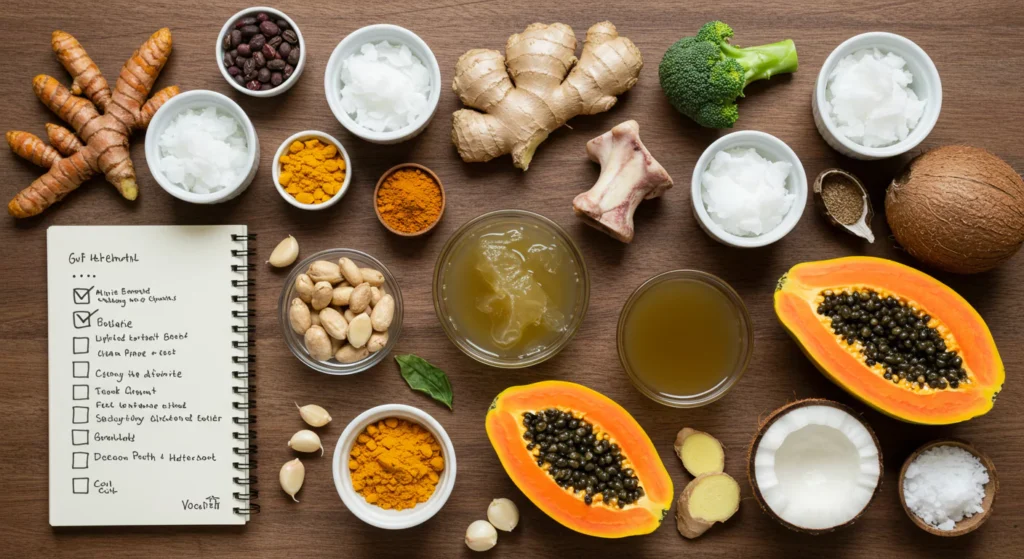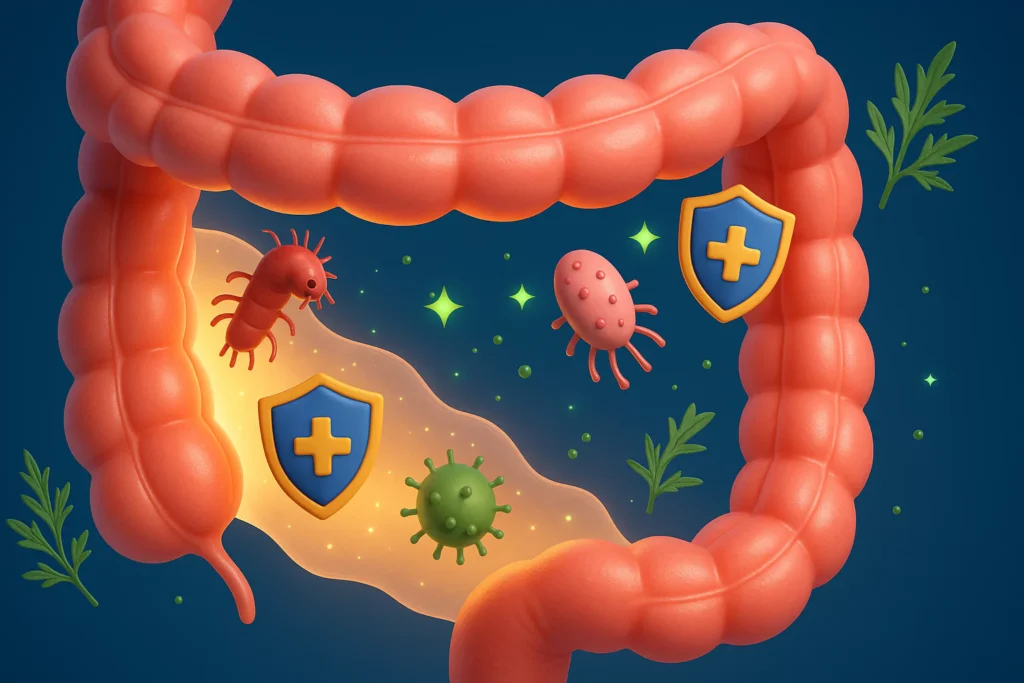Effective Parasite Cleanse Methods for Gut Health
Gut health plays a crucial role in your overall well-being, and addressing issues like parasites is essential. Parasites can disrupt your digestive system, affecting nutrient absorption and leading to various health complications. Here are several effective methods to consider for cleansing parasites and supporting your gut health.
Understanding Parasites in the Gut
Parasites can invade your intestines and wreak havoc on your gut lining. Common types include protozoa, roundworms, and flatworms. Symptoms of a parasite infection can vary but often include:
- Bloating
- Diarrhea
- Fatigue
- Unexplained weight loss
- Food intolerances
Recognizing these symptoms early can help you take action toward better gut health.
Natural Remedies for Parasite Cleansing
Several natural remedies may help in cleansing the gut from parasites. Here are some popular options:
- Garlic: Known for its antibacterial and antifungal properties, garlic can help eliminate parasites. Incorporate fresh garlic into your meals or take it as a supplement.
- Pumpkin Seeds: These seeds contain compounds that can paralyze parasites, making it easier for your body to expel them. Snack on raw pumpkin seeds or blend them into smoothies.
- Wormwood: An herb traditionally used to combat intestinal worms, wormwood can be found in tincture or capsule form. Always consult a healthcare professional before use.
- Clove Oil: Cloves contain eugenol, which may kill parasite eggs. Adding clove oil to meals or taking it as a supplement can be beneficial.
- Probiotics: After a cleanse, replenishing your gut with healthy bacteria is vital. Probiotic-rich foods like yogurt, kimchi, and sauerkraut can help restore balance in your gut flora.
Dietary Changes for a Healthier Gut
Along with natural remedies, make smart dietary choices that support gut health during your parasite cleanse. Here are some tips:
- Increase Fiber Intake: High-fiber foods like fruits, vegetables, and whole grains promote regular bowel movements, helping to flush out parasites.
- Avoid Sugar: Sugar can feed parasites and worsen an infection. Limiting your sugar intake can help reduce their presence.
- Stay Hydrated: Drinking plenty of water supports digestion and helps your body eliminate toxins more effectively.
- Incorporate Bone Broth: Bone broth is nourishing and aids in gut lining repair. It contains collagen and amino acids that can help soothe your digestive tract.
Gut Lining Repair Tips
Repairing your gut lining after a parasite cleanse is vital for long-term health. Here are ways to support your gut lining:
- Collagen Supplements: Collagen supports the integrity of your gut lining. Consider collagen peptides in your daily routine.
- L-Glutamine: This amino acid is crucial for gut health. It helps repair the gut lining and can be taken in powder or capsule form.
- Avoid Inflammatory Foods: Stay away from processed foods, gluten, and dairy, which can irritate an already sensitive gut.
- Stress Management: Stress can adversely affect gut health. Engage in relaxation techniques like yoga, meditation, or deep breathing exercises.
Consult a Healthcare Professional
Before starting any cleanse, especially if you’re dealing with a suspected parasite infection, consult with a healthcare professional. They can provide guidance tailored to your specific needs and ensure that you use remedies safely and effectively.
These methods into your wellness routine can help cleanse parasites and support your gut health. By focusing on natural remedies, dietary changes, and gut lining repair, you can take significant steps toward a healthier digestive system. Remember, consistency is key, and making these adjustments may lead you toward lifelong improved gut health.
Top Nutrients for Repairing the Gut Lining
Repairing the gut lining is essential for maintaining overall health. A compromised gut lining can lead to various digestive issues and inflammation. One effective way to support this process is by incorporating specific nutrients into your diet. Here’s a closer look at some of the top nutrients you should consider for gut lining repair.
Glutamine
Glutamine is an amino acid that plays a vital role in maintaining the integrity of the gut lining. It helps to strengthen the tight junctions between cells, preventing them from becoming too permeable. This is crucial, as a leaky gut can lead to food sensitivities and autoimmune disorders. You can find glutamine in foods such as:
- Meat
- Fish
- Dairy products
- Nuts and seeds
- Eggs
For a more concentrated source, glutamine supplements are also widely available, but it’s essential to consult with a healthcare professional before starting any new supplement regimen.
Zinc
Zinc is another powerhouse nutrient known for its role in gut health. It supports gut lining repair by promoting cell reproduction and immune function within the gut. Additionally, zinc helps in reducing inflammation and preventing damage caused by free radicals. Consider incorporating these zinc-rich foods into your meals:
- Oysters
- Red meat
- Poultry
- Beans
- Nuts
Since zinc is crucial for numerous bodily functions, ensuring you have an adequate intake can significantly benefit your gut lining health.
Omega-3 Fatty Acids
Omega-3 fatty acids are well-known for their anti-inflammatory properties. These essential fats help soothe inflammation in the gut, promoting healing. They also nourish the gut lining, making it more resilient against irritants. You can incorporate omega-3s in your diet by eating:
- Fatty fish (like salmon, mackerel, and sardines)
- Chia seeds
- Walnuts
- Flaxseeds
Add these foods to your meals for optimal gut health and to support the repair of your gut lining.
Vitamin D
Vitamin D offers various health benefits, and its role in gut health cannot be overlooked. It aids in regulating the immune system, ensuring that gut bacteria remain balanced. Research suggests that adequate vitamin D levels can help improve the gut lining’s integrity. You can raise your vitamin D levels by:
- Getting sunlight exposure
- Eating fatty fish
- Consuming fortified foods
- Taking supplements if necessary
Monitoring your vitamin D levels can make a significant difference in your overall gut health.
Probiotics
Probiotics are live bacteria that confer health benefits when consumed in adequate amounts. They help balance gut flora and enhance digestion, which is vital for gut lining repair. Probiotics assist in restoring the healthy bacteria that may be diminished due to various factors like stress, antibiotics, or poor diet. You can incorporate probiotics into your diet through:
- Yogurt
- Kefir
- Kombucha
- Sauerkraut
- Miso
Adding these foods can promote a healthier gut microbiome and support the repair processes in your gut lining.
Polyphenols
Polyphenols are compounds found in plants that have antioxidant properties. They help protect the gut lining by combating oxidative stress and inflammation. Foods rich in polyphenols include:
- Berries
- Dark chocolate
- Green tea
- Red wine
- Olive oil
A variety of polyphenol-rich foods in your diet can also enhance gut health and overall well-being.
By focusing on these vital nutrients, you can actively support the repair of your gut lining. A balanced diet enriched with glutamine, zinc, omega-3 fatty acids, vitamin D, probiotics, and polyphenols will set you on the path toward better digestive health. Always remember that each individual’s needs may vary, so consulting with a healthcare professional can help tailor a plan that best fits your diet and health goals.
Common Signs Your Gut Needs Repair
Your gut health is vital to your overall well-being, and it can significantly influence how you feel on a daily basis. However, many people are unaware of the signs that indicate their gut needs repair. If you’re experiencing any unusual symptoms, it’s essential to pay attention. Here are some common signs that suggest your gut might need some help.
Digestive Issues
One of the most apparent signals that your gut requires repair is persistent digestive problems. This can include:
- Bloating
- Gas
- Constipation
- Diarrhea
If you frequently experience these issues, it may indicate an imbalance of gut bacteria or a compromised gut lining. Consider adjusting your diet to include more fiber and fermented foods for better gut health.
Food Intolerances
If you find yourself suddenly unable to tolerate foods that once sat well with you, this can indicate gut issues. Your body’s ability to digest and absorb nutrients may be impaired. Symptoms can range from mild reactions to severe discomfort. Keeping a food diary can help you pinpoint problematic foods and address gut health.
Unexplained Fatigue
Are you feeling tired more often than usual? A damaged gut can lead to sluggishness and low energy levels. When your gut isn’t functioning properly, it can hinder the absorption of essential nutrients, leading to fatigue. Ensure you are consuming a balanced diet rich in nutrients that support energy levels.
Skin Problems
Your skin can reflect your gut health. Issues like acne, eczema, or rosacea can be symptoms of an unhealthy gut. An imbalance in gut bacteria can cause inflammation, which directly affects your skin. skin-friendly foods such as avocados and nuts can help repair gut health and, subsequently, skin issues.
Frequent Illness and Infections
If you find yourself getting sick often, it may be worth considering your gut health. A significant portion of your immune system resides in your gut. An imbalance in gut bacteria can lead to a weakened immune response. Eating probiotic-rich foods, such as yogurt, can be an effective strategy for enhancing your immune system.
Bad Breath
Halitosis, or bad breath, can also be a sign of an unhealthy gut. A compromised gut can lead to issues such as dysbiosis, which can cause an overgrowth of harmful bacteria. To combat this, focus on hydration and include parsley or mint in your diet to naturally freshen your breath.
Joint Pain
If you experience unexplained joint pain, this may also be a signal of gut dysfunction. Inflammatory conditions linked to gut issues can manifest as joint pain. Foods with anti-inflammatory properties, like fatty fish and leafy greens, may help mitigate these symptoms. Support your gut to support your joints.
Mood Changes
Your gut influences your mental health. A compromised gut can lead to mood swings, anxiety, and depression due to the gut-brain axis connection. Consuming foods that promote serotonin production can enhance mood. Fermented foods, including kimchi and sauerkraut, can encourage a healthier gut microbiome.
Sleeplessness
Struggling with sleep can also be linked to gut health. An unhealthy gut can affect hormones and neurotransmitters that regulate sleep patterns. Incorporate calming foods like dairy products or nuts before bedtime to promote better sleep and support gut repair.
Recognizing the signs that your gut needs repair is the first step toward improving your health. If you experience any of these symptoms, consider consulting with a healthcare professional for guidance tailored to your needs. Making simple adjustments in your diet and lifestyle can lead to significant improvements in your gut health, enhancing your overall well-being.
Natural Remedies for Supporting Digestive Health
Maintaining digestive health is important for overall well-being, and natural remedies can greatly aid in this process. A healthy gut supports nutrient absorption, boosts immunity, and improves mood. If you’re looking for ways to support your digestive system naturally, consider the following approaches.
Incorporate Probiotics into Your Diet
Probiotics are live bacteria that are beneficial for your gut. They help maintain a balance between good and bad bacteria. You can find probiotics in:
- Yogurt: Look for brands that contain live and active cultures.
- Kefir: This fermented milk drink is rich in probiotics.
- Sauerkraut: Fermented cabbage packed with gut-friendly bacteria.
- Kombucha: A fizzy tea that offers digestive benefits.
- Miso: A fermented soybean paste used in soups and sauces.
Try Digestive Enzymes
Digestive enzymes help break down the food you eat, making it easier to absorb nutrients. They can reduce bloating and discomfort associated with food digestion. Many natural sources provide these enzymes, such as:
- Pineapple: Contains bromelain, which helps digest proteins.
- Papaya: Enzyme papain aids in breaking down proteins.
- Ginger: This spice can stimulate digestive juices.
Stay Hydrated
Drinking enough water is fundamental for digestive health. Water supports digestion by helping dissolve food and absorbing nutrients. Aim for:
- At least 8 glasses of water per day.
- Herbal teas can also contribute to your daily hydration.
- Avoid excessive caffeine and sugary drinks, as they can disrupt digestion.
Embrace Fiber-Rich Foods
Fiber plays a key role in your digestive health. It regulates bowel movements and prevents constipation. Foods high in fiber include:
- Fruits: Apples, bananas, and berries are all fiber-rich.
- Vegetables: Broccoli, carrots, and leafy greens offer plenty of fiber.
- Whole grains: Oats, brown rice, and quinoa are great sources.
- Legumes: Beans, lentils, and chickpeas are high in fiber and protein.
Practice Mindful Eating
The way you eat can greatly affect your digestion. Mindful eating involves paying attention to the food you consume and can help improve your digestive process. Here are some tips:
- Chew food thoroughly before swallowing.
- Avoid distractions while eating, such as smartphones or television.
- Take your time; eat slowly to allow your body to signal fullness.
- Listen to your body’s hunger and fullness cues.
Use Natural Herbs
Many herbs can help soothe and support your digestive system. Consider adding some of these herbs to your meals or drinking them as teas:
- Peppermint: Known for its calming effects on the stomach.
- Chamomile: This herb relaxes the muscles of the gastrointestinal tract.
- Fennel: Can reduce bloating and gas.
Stay Active
Regular physical activity promotes healthy digestion. Gentle exercises like walking, yoga, or stretching can stimulate your digestive system and help prevent constipation. Aim for at least:
- 30 minutes of moderate exercise most days of the week.
- Additional stretching or yoga sessions can aid in relaxation and digestion.
Implementing these natural remedies can significantly contribute to your digestive health. Remember, everyone’s body is different, so it’s essential to pay attention to how your body responds to these strategies. By nurturing your gut with wholesome foods and mindful habits, you’re setting the foundation for better overall health.
Long-Term Strategies for Gut Maintenance After a Cleanse
After completing a cleanse for your gut, it’s essential to think long-term about maintaining a healthy gut environment. Your gut health plays a pivotal role in your overall well-being. Here are some effective strategies to ensure your gut stays healthy and thrives after a purification period.
1. Focus on a Balanced Diet
This should be your top priority. After a cleanse, reintroducing a wide variety of foods helps to restore balance to your gut microbiome. Aim to include:
- Fruits and Vegetables: Packed with fiber, they help feed good bacteria.
- Healthy Fats: Foods like avocados, olive oil, and nuts support gut functions.
- Whole Grains: These provide necessary nutrients and fiber that keep the gut moving.
- Lean Proteins: Foods like chicken, fish, and legumes keep your energy levels stable.
2. Stay Hydrated
Water is vital for gut health. It helps in digesting foods and keeping you regular. Aim for at least 8 glasses a day, and consider herbal teas that promote digestion, such as ginger or peppermint tea. Staying hydrated also aids in nutrient absorption and helps flush toxins from your body.
3. Incorporate Probiotics
Probiotics restore beneficial bacteria in your gut. You can introduce probiotics through:
- Fermented Foods: Foods like kimchi, sauerkraut, yogurt, and kefir are great sources.
- Probiotic Supplements: If dietary sources are challenging, consider a high-quality probiotic supplement.
These can help balance your gut microbiome and promote better digestion.
4. Limit Processed Foods
After a cleanse, it’s tempting to deviate back to processed foods. However, these foods can disrupt the microbiome’s balance. Try to limit foods high in sugar, unhealthy fats, and artificial additives. Instead, focus on whole foods, which are less likely to stress your gut.
5. Manage Stress Levels
Stress can wreak havoc on your gut. When you’re stressed, your body releases hormones that can affect your gut’s health. Consider incorporating relaxation techniques into your routine, such as:
- Mindfulness and meditation
- Yoga and stretching
- Deep breathing exercises
- Regular exercise
These methods can help improve your mental health, directly benefiting your gut.
6. Get Enough Sleep
Quality sleep is crucial for gut health. Aim for 7-9 hours of restful sleep per night. During sleep, your body repairs itself and regulates hormones that affect digestion. Establish a relaxing bedtime routine to promote better sleep, such as reading a book or practicing relaxation techniques.
7. Regular Exercise
Physical activity is known to enhance digestion and keep the gut lining in top shape. Aim for at least 30 minutes of moderate exercise most days of the week. Activities like walking, cycling, and swimming not only aid digestion but also help manage stress levels and improve sleep.
8. Listen to Your Body
Pay attention to how your body reacts to different foods. Some people may develop sensitivities after a cleanse. If a particular food seems to trigger discomfort, consider eliminating it temporarily. Keeping a food journal can help track what you eat and any symptoms you may experience.
9. Regular Check-Ups
Don’t forget about routine health check-ups. Regular visits to your healthcare provider can help monitor your gut health and catch any issues early. Discuss your diet and lifestyle changes to get personalized advice that aligns with your situation.
10. Be Patient and Consistent
Maintaining gut health is a long-term commitment. It requires patience and consistency. As you adopt these new habits, don’t expect overnight results. Give your body time to adjust and keep evaluating how you feel. Over time, you will notice improvements in not only your gut health but also your overall well-being.
Implementing these strategies will help you establish a solid foundation for sustained gut health after your cleanse. Embrace these changes, and enjoy the journey towards a healthier you!
Conclusion
Caring for your gut health is essential for overall well-being, and understanding how to effectively cleanse parasites is the first step toward a happier digestive system. As we’ve discussed, employing effective parasite cleanse methods can set the foundation for a healthier gut. Following the cleanse, prioritizing key nutrients like glutamine, zinc, and omega-3 fatty acids can significantly aid in repairing your gut lining, helping it regain its strength and functionality.
Recognizing the common signs that your gut needs repair—such as bloating, irregular bowel movements, and fatigue—can empower you to take action when necessary. Additionally, natural remedies like probiotics, bone broth, and herbal teas offer gentle yet effective support for digestive health.
However, a successful cleanse isn’t just a one-time effort; it’s crucial to incorporate long-term strategies for gut maintenance after completing your cleanse. Adopting a fiber-rich diet, staying hydrated, and managing stress will help ensure your gut remains resilient and balanced over time.
By putting these tips and strategies into practice, you can create a sustainable approach to gut health that not only cleanses but also nurtures and strengthens your digestive system for the long haul. Remember, your gut is the cornerstone of your health, and investing in it is one of the best decisions you can make for a vibrant life.
Disclaimer: The information provided in this article is for educational purposes only and should not be considered medical advice. Always consult with a healthcare professional before starting any supplement, especially if you have existing health conditions or are taking medication.
The information provided on HealthyPa.com is for educational and informational purposes only and is not intended as medical advice. The content on this website, including articles, reviews, and product recommendations, should not be used as a substitute for professional medical advice, diagnosis, or treatment.
Always seek the advice of your physician or other qualified health provider with any questions you may have regarding a medical condition or before starting any new supplement, diet, or exercise program. Never disregard professional medical advice or delay in seeking it because of something you have read on this website.
The statements regarding dietary supplements have not been evaluated by the Food and Drug Administration (FDA). These products are not intended to diagnose, treat, cure, or prevent any disease.
Individual results may vary. The testimonials and experiences shared on this website are individual cases and do not guarantee that you will achieve the same results.
If you are pregnant, nursing, taking medication, or have a medical condition, consult your healthcare provider before using any products reviewed or recommended on this site.
HealthyPa.com and its authors, contributors, and affiliated parties assume no responsibility for any consequences relating directly or indirectly to any action or inaction you take based on the information found on this website.
By using this website, you acknowledge and agree to this disclaimer.
HealthyPa.com is reader-supported. When you buy through links on our site, we may earn an affiliate commission at no additional cost to you. This helps us keep our content free and continue providing valuable health information. We only recommend products we genuinely believe in. Learn more in our full Affiliate Disclosure Policy.





Parasite cleansing must be very important. Thank you for providing this article.